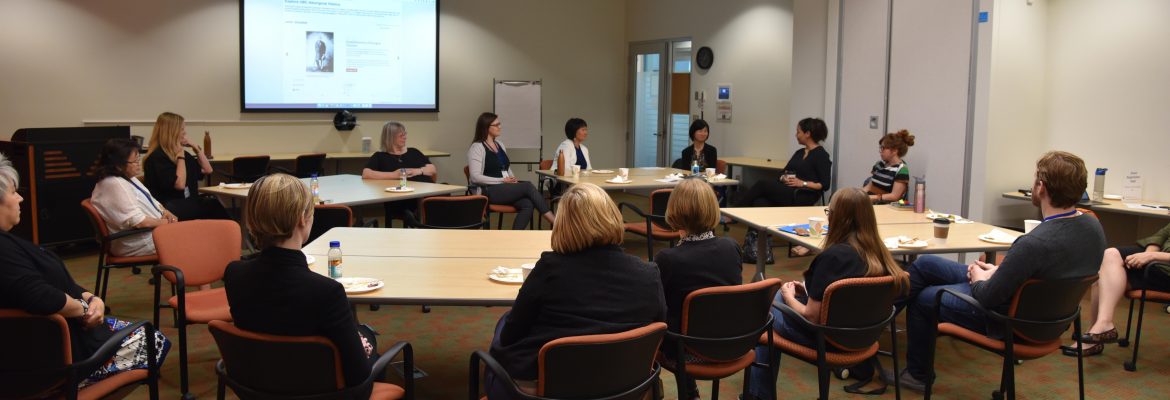From June 22 to 24, UBC co-hosted the Native American and Indigenous Studies Association (NAISA) 9th annual conference. NAISA is the largest scholarly organization devoted to Indigenous issues and research. The 2017 conference was held on the UBC Point Grey campus on the traditional, ancestral, and unceded territory of the Musqueam nation, and brought together scholars, students, researchers, and community members.
As part of the conference, CTLT’s Indigenous Initiatives team hosted a luncheon to introduce NAISA participants to available resources at UBC. The team develops and offers programming, initiatives, and consultations which support Indigenous engagement in teaching and learning. Their work is informed by their relationship with the Musqueam First Nation.
“We develop a lot of educational resources that can be brought into classes,” explained Amy Perreault, Strategist, Indigenous Initiatives. “A lot of our resources are in response to campus questions, incidences, or identifying needs.”
What I Learned in Class Today
The first resource the team shared was a research project that explores the classroom experiences of Indigenous and non-Indigenous students at UBC.
Perreault, who co-developed the project when she was an undergraduate student in the UBC First Nations and Indigenous Studies program, said that the project looks at how Indigenous topics and issues are talked about in classrooms at UBC, and what approaches have been the most productive in doing so. Through a series of video interviews with instructors, students, and administrators, the resource aims to improve dialogue around politically and culturally sensitive topics.
Indigenous Foundations
Another resource discussed was a website with key information on the histories, politics, and cultures of the Aboriginal peoples of Canada. The website is a resource that can help students address knowledge gaps that they may have.
“It’s a place where you can start your learning,” said Janey Lew, Educational Consultant, Indigenous Initiatives. She added that the goal of the website is to have an accessible and open resource that covers foundational and basic questions.
The Power of a Name
This film series features stories from community members and looks at the history of the naming practices of Totem Park, one of UBC’s student residences. The houses at Totem Park—Haida, Salish, Nootka, Dene, Shusap, and Kwakiutl— “were named with anthropological names, and not necessarily the names that represent the communities that they were intended to represent,” Perreault explained.
Two of the films look at həm̓ləsəm̓ and q̓ələχən, two new Totem Park houses completed in 2011. The names, written in hən’q’əmin’əm’, Musqueam’s ancestral language, were agreed on after a collaborative naming process which included consultations with members of the Musqueam Nation.
Time and Place at UBC: Our Histories and Relations
The final resource the team explored was an online timeline that documents UBC’s key historical moments with Indigenous peoples. It also looks at these moments within the broader contexts of UBC, B.C., and Canada’s history.
The timeline, which began development in 2012, was created by Hanae Tsukada, Educational Consultant, Classroom Climate. According to Tsukada, she wanted to look particularly at “Canada’s relationship with Indigenous peoples and how UBC’s relationship with Indigenous peoples have changed over the years.”
After receiving a Teaching and Learning Enhancement Fund grant, Tsukada is now working with the Musqueam Nation to place Musqueam events as a prominent feature of the timeline.
Further Exploration
Participants also had the opportunity to discuss what they were working on to support Indigenous engagement in their work. Conference attendees represented a variety of educational and community settings, from the University of California, Riverside, to the Fort Simpson Historical Society in the Northwest Territories, to the University of Alberta.
Among the projects participants shared were the development of MOOCS on Indigenous education and an online resource that gives students a firsthand look at the Berger Inquiry.
To learn more about Indigenous topics and issues, the Indigenous Initiatives team hosts a monthly Classroom Climate workshop series. The Indian Residential School History and Dialogue Centre will also be opening soon at UBC.

